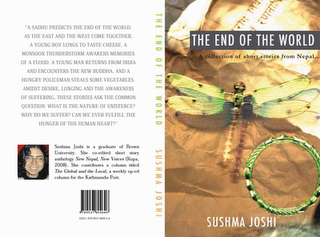Kathmandu Post review: The End of the World

Longing and loss
Sophia Furber
Hunger, both literal and metaphorical, is the driving theme behind Sushma Joshi's The End of the World. A diverse cast of characters, ranging from a policeman driven to stealing vegetables to stave off his hunger to a young worker returning to his famine-stricken village, grapple with their desires, resentments and everyday sufferings in this engaging collection of eight short stories.
Loss and longing are dealt with against a variety of social backdrops; a rural village stewing in a pre-monsoon torpor, the living quarters of small-town police station, an uptight upper-caste Kathmandu household, the living room of a wealthy Allahabad family during the Second World War. Joshi's stories plaintively ask the question of whether the hunger of the human heart can ever be satisfied.
The first story, Cheese, stands out as the most well crafted of the collection. A young boy, Gopi, sent to Kathmandu to work for his wealthy relatives as a household help, is denied the chance to taste cheese brought back by the family's eldest son on his return from Switzerland. Gopi vows that one day he too will taste this alien and glamorous foodstuff for himself, an obsession which remains with him long into adulthood. Joshi captures the mixture of awe, curiosity and envy that a returnee from foreign lands evokes in her young protagonist, and almost sacred quality with which foreign goods, right down to the tin-foil wrappers of Swiss chocolate, are imbued by members of the family. Cheese -- which Gopi hears as the Nepali word chij, meaning 'thing' -- becomes the focus of inexplicable longings, and is elevated to almost mythical status; "the humble thing-i-ness of the word had suddenly travelled to the exotic underworld of the senses and came up packaged in silver foil and cardboard, smelling of timezones and jetlag... the word suddenly had status."
The kind of simple literalism of the cheese/chij confusion is a recurring motif in the collection, as the characters grasp for solutions to their problems or means to satisfy their desires in a confusing world. In the final story, The Blockade, a young man takes a detour on his way back home from India to track down Ram Bahadur Bomjom who has learnt to survive without food or water, so that he can discover the famous 'Buddha boy's' secret and help the inhabitants of his native village to survive a famine. In the story The End of the World, Kathmandu is sent into a frenzy by a sadhu's predictions that the end of the world is near -- and a man from a hard-up family decides that the natural reaction to the coming of the apocalypse is to blow the household budget on ingredients for a lavish final meal, to his wife's dismay. The sacred and mundane sit very close together throughout this collection of stories.
Nepal's turbulent politics of recent years are never far from Joshi's mind in this collection. The spectre of political violence hangs over a sleepy afternoon at the village tea shop in Waiting for the Rain, in which a taxi driver comes to while away a day with his relatives discussing forthcoming elections, and wonders why his old friend Harka has become so burdened with grief. Betrayal tells the story of a friendship forged between two young men during years of migrant labour in India which is put to the test when the pair gets involved with the Maoist insurgency on their return home. Throughout her collection of stories, Joshi views political turmoil through the prism of the sufferings, desires and foibles of individuals, while the specifics of political parties, the state and the insurgency ultimately merge into the background. Betrayal goes as far as to give us a narrator whose decision to break with the Maoists and turn back to capitalism boils down to poor rice rations (“I was just getting really tired of the old useniko rice. You know what I mean? After fifteen years of eating good rice in Mumbai you don't want to go back and be eating some stinking shit stolen from an army barracks”). While Joshi's focus on the individual hungers and desires amid the conflict is successful throughout much of the collection, there are a few moments at which her attempts to marry political narratives with personal ones are less convincing, such as the first-person descriptions of life with the insurgents in Betrayal.
What makes The End of the World stand out as a collection of short stories is Joshi's masterful and elegant use of language. This volume is packed with delightfully inventive turns of phrase -- a personal favourite is the ironic discussion of the virtues of Switzerland compared to Nepal in Cheese ("That land of mountains, that mirror image of peaks, but so much more Westernised, so much more modern than Nepal's own mythologically burdened ones")
The End of the World is a confident debut collection for Joshi, in which the deceptively simple exterior of her prose peels away to reveal multiple layers of investigation into human longing and emptiness.
Posted on: 2009-03-07 20:48:48 (Server Time)

Comments